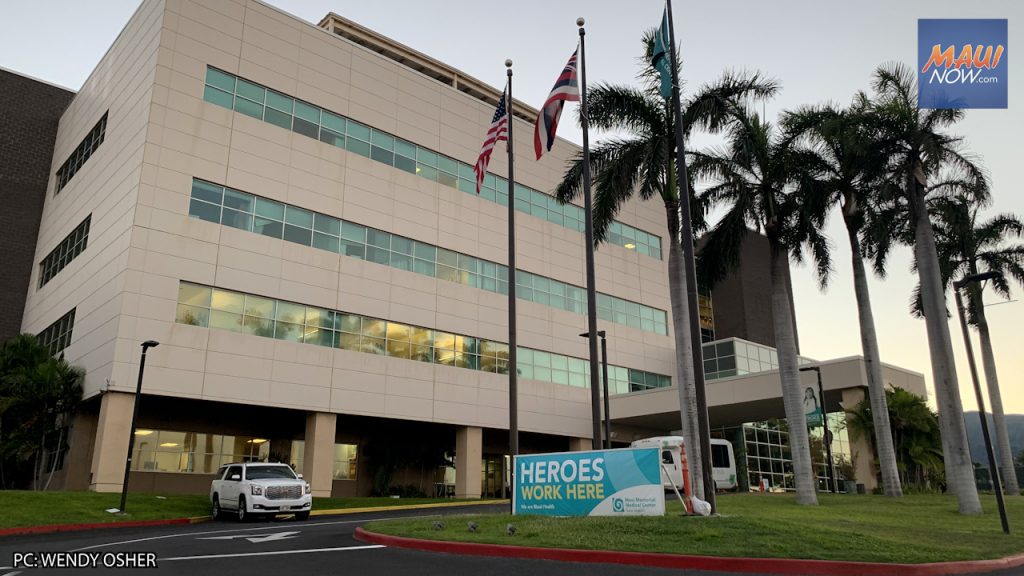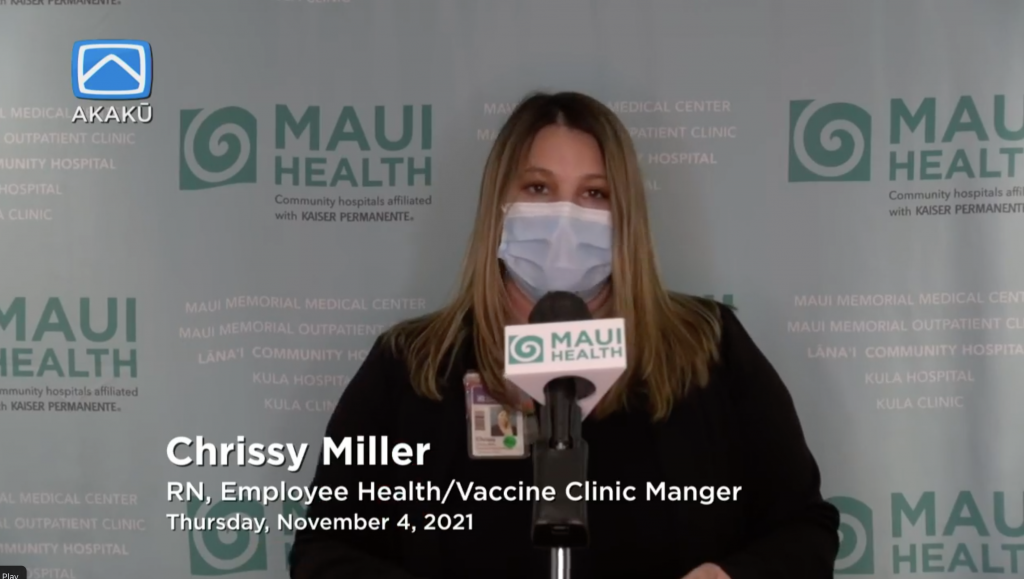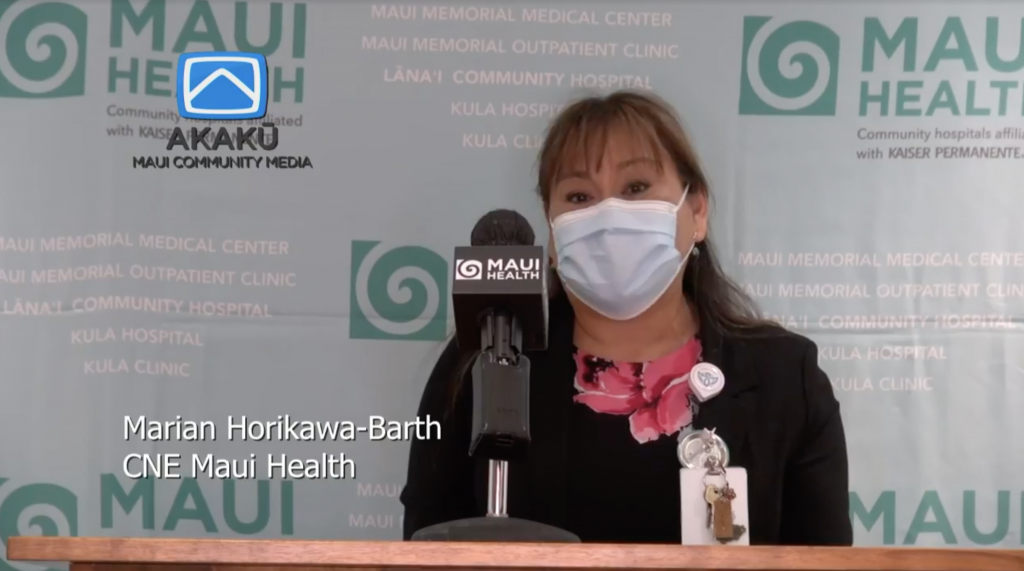Maui Health Updates: Status of Vaccine Availability for Kids, Hospital Operations
Executives at Maui Health provided updates on the hospital’s vaccine mandate, the status of vaccine availability for kids, and hospital operations. The information was shared during the hospital’s last community Town Hall event of the year, held on Thursday.

Marked Improvement Over Two Months as we Head into the Holidays
“The last time that we were here, we were in a much different situation,” said Wade Ebersole, Chief Operating Officer with Maui Health. “Delta was nearly at its peak, the hospital was incredibly busy, our staff were going to great lengths to keep people safe. We have since seen COVID wane in the past couple of weeks and we’re in a much better position right now. In fact, the infection rate is about one quarter of what it was two months ago.”
As infection rates go down and vaccinations eligibility expands, Maui Mayor Michael Victorino and Governor David Ige have announced the easing of some restrictions, effective Nov. 12, 2021.
“It’s a welcome sign,” said Ebersole. “One of the reasons we’re seeing such low numbers is because a number of our community members have been vaccinated. We know that this is one of the most important things you can do to help curb the spread of this disease, and we thank everyone who has made the decision to do that.”
As of Thursday, there were just two COVID-19 patients in the Maui hospital–neither were in the ICU or on a ventilator. This is a stark contrast from mid-August when the Maui Memorial Medical Center had 39 COVID-19 positive patients in the hospital, seven in Intensive Care and four on ventilators.
Ebersole said despite the improvement, there’s still a lot of work to be done, noting that the hospital remains very busy.
Dr. Michael Shea, Chief Medical Director at Maui Health said, “We’re hoping that as we begin to gather, we remember to continue to do things that have prevented spread of this disease as we go into Thanksgiving, Christmas and New Year’s.”
“Thinking ahead to the holidays, if you’re going to gather, gather outside… Keep in mind again, social distancing, masking when you can, stay responsible, and let’s keep everybody safe,” said Dr. Shea.
Impacts of Vaccination Expansion to 5-11 Year Olds
By including the 5-11 age group in vaccination data statewide, Maui County is at a 68% completion rate, and 74% of the eligible population has received at least one dose.
“In the last surge, which was our largest surge to date, we did notice that a lot of the community spread stemmed from keiki who were eligible for vaccination, brining home and spreading it to susceptible adults at home,” said Dr. Shea. “So again, making sure that we get those who are eligible vaccinated, is of vital importance to our community.”

Hospital leaders say the vaccination does for small children between 5-11 years old has been ordered for the hospital, but had not yet arrived as of Thursday.
The Food and Drug Administration granted Emergency Use Authorization of the Pfizer vaccine for the age group. The dosage for 5-11 year olds is 10 micrograms, 1/3 the dose used for adults. The Centers for Disease Control and Prevention approved administration of the vaccine earlier this week.
Shipments of the state’s initial order of 41,700 doses of vaccine for children began arriving in the state on Monday. Some medical providers on Oʻahu and Kauaʻi have already begun offering the vaccine after receiving their shipments.
“We put in an order for the pediatric doses. We’re waiting for arrival of those doses. They haven’t arrived yet,” said Chrissy Miller, RN, Employee Health and Vaccine Clinic Manager at Maui Health. “So at this time, we’re only vaccinating those that are 12 and older; but as soon as we’re ready and we have the vaccines in, we’re going to go ahead and post on our website at https://www.mauihealth.org/covid-19/covid-19-vaccine/.”
Who is eligible to receive a vaccine or booster?
Booster shots available to all eligible individuals, as approved by the CDC, including many frontline workers, whose occupation or workplace settings present an increased risk of infection or transmission of COVID-19. As mentioned above, the dosing for 5-11 year olds had not yet arrived at the hospital as of Thursday.
Maui Health is also administering Pfizer vaccine booster doses to:
- Individuals who have already received both doses of the Pfizer or Moderna vaccine, with the last dose received at least six months ago, AND who also meet one of the following criteria:
- Are 65 years of age or older, or
- Nursing home or assisted living residents, or
- Foster homes and community care home residents, or
- Are 18 to 64 years of age with underlying medical conditions, including cancer, diabetes, asthma, HIV infection, heart disease, and obesity, or
- Are 18 to 64 years of age with increased risk for COVID-19 exposure and transmission because of occupational or institutional setting, including but not limited to healthcare, correctional facility staff and prisoners, and individuals in homeless shelters
- Individuals who received one dose of the J&J vaccine at least two months ago and are ages 18 and older.
Mix & Match booster doses:
“The FDA did release that you can mix and match for the booster dose,” said Miller. “So, if you had two doses of the Pfizer, two doses of Moderna, or a single dose of Johnson & Johnson, and it’s been six months, you can then go ahead and mix and match.”
Miller noted that the Maui Memorial Medical Center is offering Pfizer as the booster dose at their clinic, which is located in the front lobby.
Maui Health has expanded hours for the month of November. The clinic is open from 8:30 a.m. to 12 p.m. and 1-4 p.m., Monday through Friday.
DAISY Award Launched to Honor Extraordinary Nurses:
Maui Health announced the launch of a new DAISY Award to honor extraordinary nurses as they continue to work through the pandemic.
Since 1999, DAISY, which is an acronym for Diseases Attacking the Immune System, has been honoring nurses .
“Nurses have had to go above and beyond with compassionate care,” said Marian Horikawa-Barth, Chief Nurse Executive at Maui Health. “The DAISY Foundation was formed by the family of Patrick Barnes who died at age 33. He died of complications of Idiopathic Thrombocytopenic Purpura. The nursing care that Partick was provided during his hospitalization profoundly touched his family… Today DAISY awards programs are seen nationally and internationally in about 5,000 health care facilities,” said Horikawa-Barth.
She encouraged the public to consider nominating nurses for recognition under the program.
“These expressions of gratitude from families and patients really go a long way in supporting nurses, especially in their high stress job, and in this high tension time… Especially right now when we have a shortage of nurses across the country, we want to retain as many nurses as possible,” said Horikawa-Barth.
Details are available at the Maui Health website.

Q&A:
What’s the Latest on the Maui Hospital Visitor Policy
With declining numbers of COVID cases, the Maui Memorial Medical Center continues to evaluate the hospital’s visitor policy.
“Within the Emergency Operations Council, we are constantly evaluating a number of different policies,” said Ebersole. “We know how important family is to the healing environment. We want desperately for family members to have access to their loved ones while they are in the hospital. Balancing that with the risk to the visitors, and the risk to staff, and to patients.”
As of the middle of last month, Ebersole said, the hospital did open up visitation, but it remains “really limited” at this time. Only those who are vaccinated can visit their loved ones in the hospital.
“There is a second phase to that where we will open up the hospital visitation to everyone independent of their vaccine status; and we are evaluating the case rates in the community before we make that decision,” said Ebersole.
What are you doing with employees who refuse vaccination?
To date, Maui Health has provided more than 71,000 doses of the COVID-19 vaccine to eligible participants. More than 97% of the workforce at Maui Health has been fully vaccinated.
“As many of you may know, from the beginning I have said that choosing to get vaccinated or not, getting vaccinated is a personal decision, and that everyone has their reasons for making the decision. As health care workers, we have all been held to a higher standard, and I think that’s what’s happening now–being held to a higher standard, and I happen to agree that we should be,” said Dr. Shea.
“We, along with every other hospital in the state, all the county workers, state workers, most of the hospitals in the country, have mandated vaccines because it’s the right thing to do for our community. People do have the individual right to make a decision not to follow that mandate,” said Dr. Shea.
“At this point, for people who choose to apply for exemptions–there are exemptions potentially for deeply held beliefs in religion that may oppose vaccination or medical reason why they’d have contraindication to vaccination. They can apply for those. Those will be evaluated and if they are accepted, those individuals can be tested twice a week and continue to work,” said Dr. Shea.
If someone does not get the exemption or refuses to participate, they would be placed on administrative leave without pay for 60 days.
“The medical staff is an independent body that works with the hospital, and their Medical Executive committee also has imposed a vaccine mandate for them,” said Dr. Shea.
The Department of Health and Human Services released its rule on Thursday, to ensure that the nation’s healthcare workers are vaccinated. President Biden said, “No one should be at risk when they seek medical care.” Information on that rule is posted here.
Monoclonal Treatment Clinic at Maui Lani to End Nov. 12:
“Right now there are a number of places where you can be treated if you test positive for COVID-19, and you meet the criteria for this,” said Ebersole.
Maui Health partnered with Kaiser to set up a clinic outside the Maui Lani facility in Wailuku. “That will run through Nov. 12. After that, you can receive treatment here at the hospital,” said Ebersole.
“And if you contract COVID and think you’re eligible, please reach out to a trusted provider. They will help guide you through the appropriate steps to receive this treatment,” he said.

Emergency Use Authorization vs. Full Approval for COVID-19 Vaccines:
Emergency Use Authorization is invoked by the FDA when there is an urgent public health need.
“What it allows them to do is to shorten the time of some of the steps of the process,” said Dr. Shea. “But they don’t skip any of the steps. So they may not have as much data as [they would] for a full approval. There are some other time steps that are very time consuming and not as critical as the safety data. So they do review safety data, they review all the safety data carefully. If they feel there is no significant safety risk, then they will give Emergency Use Authorization,” said Dr. Shea.
Can people get pericarditis or myocarditis after taking the vaccine?
According to the Centers for Disease Control and Prevention, myocarditis is inflammation of the heart muscle, and pericarditis is inflammation of the outer lining of the heart.
“There are case reports of getting pericarditis… or myocarditis, which is inflammation of the heart muscle itself, after getting COVID vaccines. These cases are extremely rare. There are approximately 60 cases per million people who got the vaccine,” said Dr. Shea.
“The symptoms tend to be things like severe chest pains, severe shortness of breath, which would cause you to seek care anyway, and the FDA has discussed this and feels the risk is very, very small and is acceptable,” said Dr. Shea.
Why isn’t natural immunity considered as fulfilling the vaccine requirement? Can you test for antibodies?
“The CDC actually released a very large study last Friday, which looks at this very question,” said Dr. Shea.
“What they saw was people who had COVID, had some immunity. People who got vaccinated who hadn’t had COVID actually got better immunity than those who had COVID. But the people who had the best immunity were people had COVID and then got vaccinated,” according to Dr. Shea.
“We want you to have the best protection possible. The lowest protection is having had COVID by itself without getting vaccinated, and so… you have to be vaccinated, whether you’ve had COVID or not, essentially,” he said.







_1768613517521.webp)






